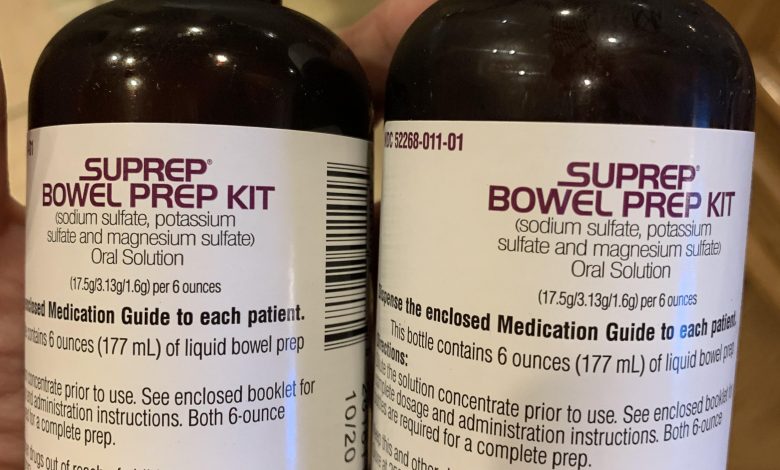A Doctor’s Suprep Bowel Prep Experience

An unnamed gastroenterologist who cheated on colonoscopy prep wrote “So I scheduled a colonoscopy and requested Suprep bowel prep. I choose Suprep because it is what I usually give out to patients…I’ve noticed that most people seem to complain the least about the taste of Suprep when compared to most other preps. That’s not to say that the other preps are inferior…I use them interchangeably. However, I wasn’t about to get two or three more colonoscopies just to test out all the preps, so the Suprep experience is what you get to hear about!
I was given the usual instructions for split-dose bowel prep: 1) Clear liquids only the entire day prior to the procedure; 2) Take the first dose of prep at 5 PM and the second dose of prep 5 hours before the procedure start time; 3) Nothing to eat or drink after the second dose of prep. Pretty standard stuff, these are the instructions I usually give to my patients. Following this will lead to a good or excellent bowel prep in the vast majority of people. But what if I told you that I did something different but still achieved an excellent clean-out?
I cheated on the prep. I ate solid food the day before. Now before anybody gets too excited, I ate a very limited and small amount of food, but it made a huge difference in the ability to tolerate the entire process. The following is my “justification” for my cheating, other than the obvious reason of “I was hungry.” I wake up around 5:00 AM or earlier every day. I usually wake up starving and if I don’t eat something within an hour or so of waking I usually feel weak and like my head is spinning. I’ve been this way as far as I can remember, even back in elementary school. I had a long day ahead of me at work, and knew that without some calories in me I would crash in the mid-morning while doing procedures and not be able to function well. “It’s for the patients,” is what I told myself. I almost believed it, too!
So that morning I ate a good-sized bowl of plain vanilla yogurt (no toppings, nuts, fruit, etc.) I also had a few pieces of white toast with butter. We usually don’t have white bread in the house, but we were lucky to have an unseeded loaf of Italian bread from the night before that I toasted in the toaster and buttered up. For lunch, I had a huge gelato without any nuts or toppings. Throughout the day I drank black coffee and plenty of clear liquids.
I got home around 6 PM that day (a little later than the recommended 5 PM start time) and began drinking the prep. I mixed the first part of the prep with water as recommended and took a sip. Thinking that I’d be really slick, I used a straw to try and bypass my taste buds. “Not terrible,” I thought to myself, relieved that this process wasn’t going to be as bad as many patients made it sound. The prep tasted like a mixture of seawater, dish soap, and grape cough syrup…yum! A few sips later and I was rethinking this whole thing…the cumulative effect of drinking the prep made each sip taste grosser than the last. After drinking about one-quarter of the first 16 ounces of the stuff, I put the container in the fridge and took a 10-minute break to pace around the house and rethink my strategy.
Going back to the prep in the fridge, I took a few more sips through the straw. Why was it taking so long to drink this stuff? If this were water I could have drank the whole thing in five minutes. I think the straw is actually slowing the process down. I ditched the straw and was able to drink the prep much faster. A few gulps later I was half-way done with the first round. I put the container back in the fridge since the colder the prep was the less bad it tasted. It’s now about 6:20 PM and I suddenly felt a strange grumbling in my lower abdomen.
I was surprised at how fast this stuff works! I figured it would take an hour or so to have any effect, or at least give me some warning first. I was wrong on both counts! With 8 oz. of the nasty stuff down so-far, I was lucky that my bathroom was only a few steps away! Immediate watery diarrhea was the result. The thing I wasn’t expecting was the total lack of pain, cramps, or any discomfort whatsoever. It was as someone just opened the faucet, then closed it again. Magic!
I finished the rest of that evening’s prep over the following 20-30 minutes in between several other sprints to the bathroom. The prep was definitely easier to drink when cold straight out of the fridge. It was about 7PM and the bowel movements were coming fast and furious now. I also noticed that I was incredibly thirsty all of a sudden. I chugged 32 ounces of room temperature Gatorade in about five minutes flat. I wanted more, but only had tomorrow’s ration in the house. Therefore I drank a glass or two of water. By 9PM, all was quiet. I mixed tomorrow morning’s prep and put it in the fridge to chill overnight. I woke from sleep around 1AM for one more small bowel movement, but it was no big deal. I actually got decent sleep.
The next morning, I woke up at my usual time of 5AM. I drank 2 cups of black coffee as soon as I woke up. This was followed by another 16 oz. of Suprep over the next 45 minutes. I would gulp down about 4 oz. at a time, then rest for 10-15 minutes and repeat until done. This time, the bowel movements started immediately after taking the first bit of the prep and were mainly yellowish water. Another 32 oz. of Gatorade down the hatch and the process was complete. The last 2-3 bowel movements were literally clear water, like as clear as the water that comes out of the faucet. Cool, I did it!”





